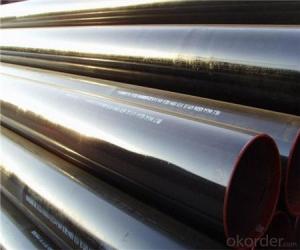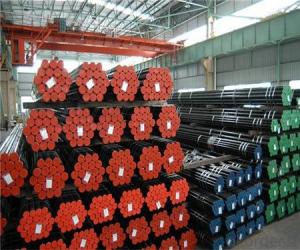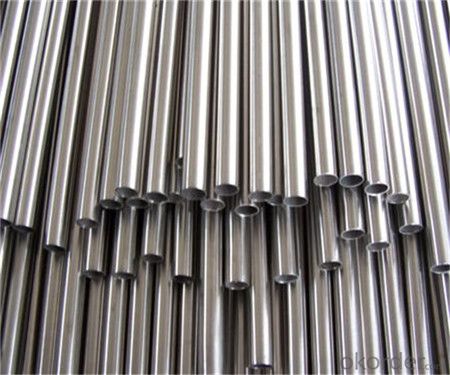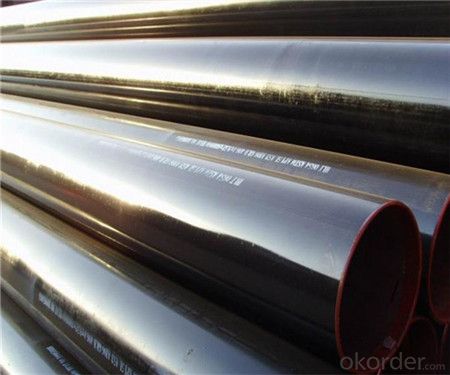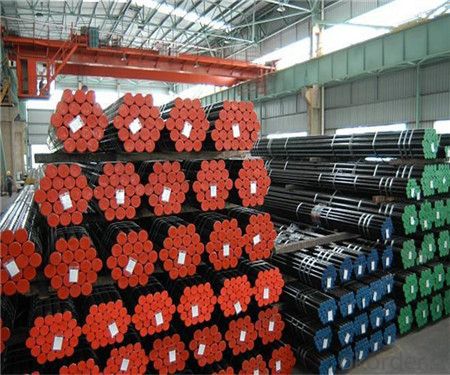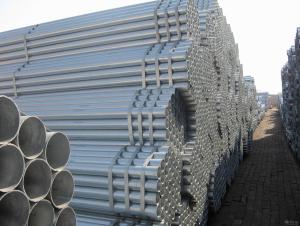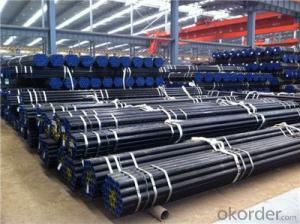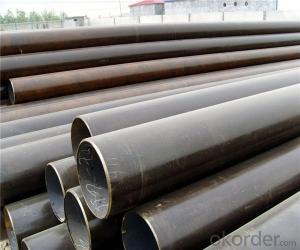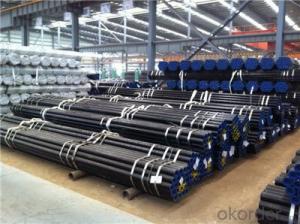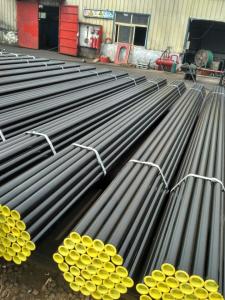Best Price Seamless Steel pipe Made in China from CNBM
- Loading Port:
- Tianjin
- Payment Terms:
- TT OR LC
- Min Order Qty:
- 25 m.t.
- Supply Capability:
- 2000000 m.t./month
OKorder Service Pledge
OKorder Financial Service
You Might Also Like
1、Structure of Best Price Seamless Steel pipe Made in China from CNBM:
Seamless pipe is formed by drawing a solid billet over a piercing rod to create the hollow shell. As the manufacturing process does not include any welding, seamless pipes are perceived to be stronger and more reliable. Historically seamless pipe was regarded as withstanding pressure better than other types, and was often more easily available than welded pipe.
2、Main Features of Best Price Seamless Steel pipe Made in China from CNBM:
• High manufacturing accuracy
• High strength
• Small inertia resistance
• Strong heat dissipation ability
• Good visual effect
• Reasonable price
3、Best Price Seamless Steel pipe Made in China from CNBM Specification:
Standard | GB, DIN, ASTM ASTM A106-2006, ASTM A53-2007 |
Grade | 10#-45#, 16Mn 10#, 20#, 45#, 16Mn |
Thickness | 8 - 33 mm |
Section Shape | Round |
Outer Diameter | 133 - 219 mm |
Place of Origin | Shandong, China (Mainland) |
Secondary Or Not | Non-secondary |
Application | Hydraulic Pipe |
Technique | Cold Drawn |
Certification | API |
Surface Treatment | factory state or painted black |
Special Pipe | API Pipe |
Alloy Or Not | Non-alloy |
Length | 5-12M |
Outer Diameter | 21.3-610mm |
Grade | 20#, 45#, Q345, API J55, API K55, API L80, API N80, API P110, A53B |
Standard | ASME, ASTM |
1) Material:20#(ASTM A 106/A53 GRB.API5LGRB,GB),45#,16Mn,10#.
2) Specification range:OD:21.3-610mm,WT:6-70mm,length:6-12m or according to the requirement of clients.
3) Excutive standards:GB,ASME API5L.ASTM A 106/A53,Despite of the above standards,we can also supply seamless steel pipe with standard of DIN,JIS,and so on,and also develop new products according to the requirements of our clients!
4) Surface:black lacquered,varnish coating or galvanized.
5) Ends:Beveled or square cut,plastic capped,painted.
6) Packing:bundles wrapped with strong steel strip,seaworthy packing.
4、Packaging & Delivery
Packaging Details: | seaworthy package,bundles wrapped with strong steel strip |
Delivery Detail: | 15-30days after received 30%TT |
5、FAQ of Best Price Seamless Steel pipe Made in China from CNBM:
①How is the quality of your products?
Our products are manufactured strictly according to national and internaional standard, and we take a test
on every pipe before delivered out. If you want see our quality certifications and all kinds of testing report, please just ask us for it.
Guaranteed: If products’ quality don’t accord to discription as we give or the promise before you place order, we promise 100% refund.
②How about price?
Yes, we are factory and be able to give you lowest price below market one, and we have a policy that “ for saving time and absolutely honest business attitude, we quote as lowest as possible for any customer, and discount can be given according to quantity”,if you like bargain and factory price is not low enough as you think, just don’t waste your time.Please trust the quotation we would give you, it is professional one.
③Why should you chose us?
Chose happens because of quality, then price, We can give you both.Additionally, we can also offer professional products inquiry, products knowledge train(for agents), smooth goods delivery, exellent customer solution proposals.Our service formula: good quality+good price+good service=customer’s trust
SGS test is available, customer inspection before shipping is welcome, third party inspection is no problem.
6、Best Price Seamless Steel pipe Made in China from CNBM Images:
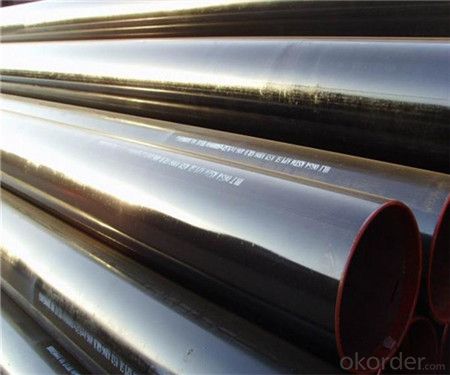
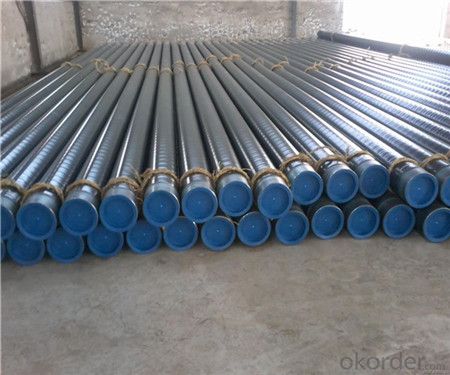
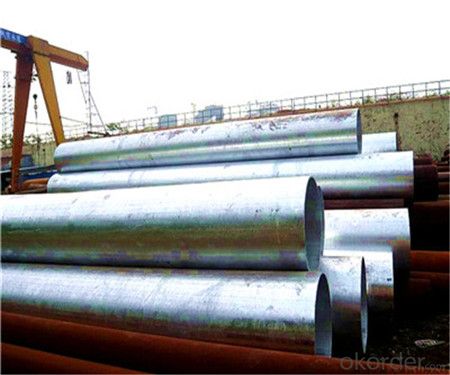
- Q: Are steel pipes affected by UV rays?
- Yes, steel pipes can be affected by UV rays. Over time, exposure to UV radiation can cause the steel to degrade and weaken. It can lead to surface oxidation, discoloration, and in extreme cases, structural damage. To prevent this, protective coatings or paint can be applied to shield the steel pipes from UV rays.
- Q: How much is 4 inches steel tube MM?
- The nominal diameter of the 4 inch steel pipe is DN100, that is to say, the diameter of the center of the pipe wall is 100mm.
- Q: How do you determine the required wall thickness for steel pipes?
- The determination of the necessary wall thickness for steel pipes involves the consideration of multiple factors and calculations. One of the main factors to be taken into account is the pressure to which the pipe will be exposed. As the pressure increases, a thicker wall is required to guarantee that the pipe can endure the internal forces. The material strength of the steel used for the pipe is also a significant factor. Different steel grades possess varying tensile strengths, which directly impact the required wall thickness. Tensile strength refers to the maximum stress a material can withstand before failing, making it crucial to select a steel grade capable of withstanding the expected pressure. Furthermore, the pipe's diameter is influential in determining the necessary wall thickness. Pipes with larger diameters typically necessitate thicker walls to maintain their structural integrity and prevent deformation under pressure. Engineers employ industry standards and formulas to calculate the required wall thickness. The American Society of Mechanical Engineers (ASME) B31 code is the most widely used standard, offering guidelines for designing pressure piping systems. The ASME code integrates safety margins, material properties, and pressure ratings to determine the appropriate wall thickness. Other factors, such as temperature, corrosion, and external loads, can also influence the necessary wall thickness. For instance, applications involving high temperatures may require thicker walls to prevent buckling or softening of the pipe. In conclusion, the determination of the required wall thickness for steel pipes involves the consideration of pressure, material strength, diameter, temperature, and other external forces. Engineers rely on industry standards and calculations to ensure the pipe's ability to safely withstand the intended operating conditions.
- Q: How do you determine the pipe schedule for steel pipes?
- Several factors, including pressure rating, wall thickness, and outer diameter, are taken into account to determine the pipe schedule for steel pipes. The pipe schedule serves as a standardized system that classifies the thickness of pipe walls, ensuring compatibility and safety in various applications. To ascertain the pipe schedule for steel pipes, one must consider the maximum pressure the pipe will endure, typically measured in pounds per square inch (psi) or bars. The pressure rating indicates the pipe's ability to withstand pressure without experiencing failure or leakage. Higher pressure ratings necessitate thicker pipe walls. Another crucial factor in determining the pipe schedule is the wall thickness, typically expressed in inches or millimeters. The wall thickness directly correlates with the pressure rating, as thicker walls have the capacity to handle higher pressures. The American National Standards Institute (ANSI) has established a set of standardized wall thicknesses for steel pipes known as the "pipe schedule." The outer diameter of the pipe is also taken into consideration when determining the pipe schedule. The specific application and requirements influence the outer diameter variation. Selecting a pipe with the appropriate outer diameter is essential to ensure proper fit and compatibility with fittings, valves, and other components. In conclusion, the pipe schedule for steel pipes is determined by examining the maximum pressure, wall thickness, and outer diameter. By aligning these factors with the suitable pipe schedule, one can guarantee that the steel pipe is appropriate for its intended usage and capable of withstanding the required pressure.
- Q: Can steel pipes be used for structural supports in buildings?
- Yes, steel pipes can be used for structural supports in buildings. Steel pipes are known for their strength, durability, and ability to withstand heavy loads. They have high tensile strength, which means they can withstand large amounts of tension and compression without breaking or deforming. This makes them ideal for structural applications in buildings where strong and stable supports are required. Steel pipes can be used for various purposes such as columns, beams, trusses, and even as the main support for the entire building. They are also versatile and can be easily fabricated and customized to fit specific design requirements. Additionally, steel pipes are resistant to fire, corrosion, and pests, making them a reliable choice for long-term structural support in buildings.
- Q: What is the role of steel pipes in the transportation of liquefied natural gas (LNG)?
- Steel pipes play a crucial role in the transportation of liquefied natural gas (LNG) as they are used to create the necessary infrastructure for the safe and efficient transfer of LNG. These pipes are designed to withstand the extreme cold temperatures and high pressures associated with LNG, ensuring the integrity and reliability of the transportation system. They are used to construct LNG terminals, storage tanks, and pipelines, providing a secure conduit for the LNG to be transported from production sites to distribution centers or export facilities. Steel pipes are preferred due to their strength, durability, and ability to resist corrosion, making them essential for the smooth and reliable transport of LNG across long distances.
- Q: What is the difference between steel pipe and polyethylene pipe?
- The main difference between steel pipe and polyethylene pipe lies in their materials and properties. Steel pipe is made from a durable and strong material, which makes it suitable for high-pressure applications and environments where strength is crucial. On the other hand, polyethylene pipe is made from a plastic material that offers flexibility and resistance to corrosion, making it ideal for underground and aboveground installations. Additionally, steel pipe requires welding or threading for connections, while polyethylene pipe uses fusion or mechanical fittings. Ultimately, the choice between steel pipe and polyethylene pipe depends on the specific requirements of the project and the desired characteristics needed.
- Q: What is the difference between seamless and welded steel pipes?
- The main difference between seamless and welded steel pipes lies in their manufacturing process. Seamless pipes are made by piercing a solid billet of steel, while welded pipes are formed by rolling steel sheets and then welding them together. This difference in production methods results in varying levels of strength, durability, and cost. Seamless pipes are generally stronger and more reliable, as they have no welded seams that can weaken the pipe. However, they are also more expensive to produce. On the other hand, welded pipes are more cost-effective but may have weaker points at the welded seams. Ultimately, the choice between seamless and welded steel pipes depends on the specific application and requirements of the project.
- Q: Can steel pipes be used for fencing?
- Yes, steel pipes can be used for fencing. Steel pipes are durable, strong, and resistant to corrosion, making them an excellent choice for fencing applications. They can be used to create secure and long-lasting fences in various settings, such as residential, commercial, or industrial properties.
- Q: Can steel pipes be used for underground utility lines?
- Yes, steel pipes can be used for underground utility lines. Steel pipes are commonly used for various underground applications, including utility lines for water, gas, and sewage. They are durable, strong, and resistant to corrosion, making them suitable for long-term use in underground environments. Additionally, steel pipes can be easily welded and connected, allowing for efficient installation and maintenance.
Send your message to us
Best Price Seamless Steel pipe Made in China from CNBM
- Loading Port:
- Tianjin
- Payment Terms:
- TT OR LC
- Min Order Qty:
- 25 m.t.
- Supply Capability:
- 2000000 m.t./month
OKorder Service Pledge
OKorder Financial Service
Similar products
Hot products
Hot Searches
Related keywords

